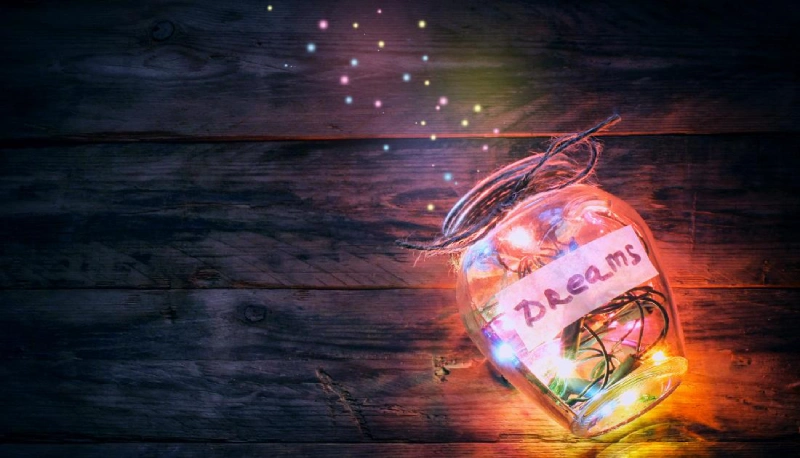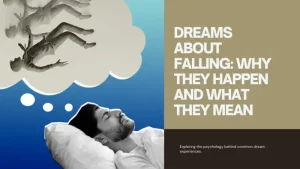
What are Dreams? Understanding 8 Common Dreams
Almost all living beings on this earth need sleep, except for plants, arthropods, cnidarians, and fungi. We humans have conducted extensive research on sleep. The benefits of good sleep are no longer hidden from anyone, and we can feel them in our lives.
There is a scientific explanation for why nature gave us sleep—our brains need rest, our neurons need a reset, our muscles need relaxation, etc. But does this really happen? Does our brain actually rest when we’re sleeping? If that’s the case, then why do we dream? Dreaming also requires the brain to work, so why does this happen? Ideally, we shouldn’t dream at all during sleep, and upon waking up, we shouldn’t remember anything because our brain was resting while we were asleep.
We all have an average of 1-6 dreams every day, and most dreams occur during our deep sleep stage, also known as REM sleep. We can’t remember all our dreams, but when we have strange, scary, or unrealistic dreams, certain things tend to stick with us. So let’s explore dreams today and try to understand why we dream, why we can’t remember all of them, and, most importantly, what they mean.
Understanding the Nature of Dreams

Our brain contains trillions of neurons, constantly firing signals, and it also stores memory, including emotions, places, people’s faces, their habits, thoughts, and events. While our 3-pound brain is processing all this when we’re awake, neurons continue firing signals even when we go to sleep. During this time, our memory shows us these dreams, where we usually see familiar faces, locations, and symbols, but sometimes we also encounter very strange things that we might never have seen, felt, or even thought about in real life. These kinds of dreams often occur during deep REM sleep.
Reason Why Do Dreams Sometimes Slip Away?

Why don’t we remember our dreams? Well, the answer lies in our biology. Research has found that the neurons in our brain responsible for memory, known as neurotransmitters, are least active during deep sleep. Moreover, psychoanalytic theory also suggests that the content of our dreams plays a significant role in our ability to forget them. In other words, if a dream is very traumatic, distressing, or far from reality, it’s quite possible that our brain doesn’t store it in memory, and we forget it soon after waking up. The quality of your sleep might also be a factor; if you don’t enter deep REM sleep, which is most responsible for strange dreams, you either don’t dream at all or quickly forget them upon waking.
Decoding the Meaning Behind Your Dream

Dreams have been discussed in many cultures for centuries, from Egypt to Hinduism, Buddhism, and Judaism. People in those times also speculated about dreams and believed that they contained some sort of message or indication.
Today, with the help of science, we conduct a lot of research on dreams, but we still don’t have a precise understanding of them. We can only guess how accurate our interpretations of dreams are. The images, messages, and situations we see in dreams—do they have any real meaning, or are they just reflections and creations of our subconscious mind?
Researchers are divided into two groups when it comes to dreams. One group believes that every moment in a dream has meaning, while the other group argues that there’s no inherent meaning in dreams—they are simply the product of the subconscious mind’s memories and experiences.
The Austrian neurologist Sigmund Freud is known as the first person to try to explain the exact meaning of dreams. For instance, if you see a king or queen in your dream, don’t assume it’s because you might have been one in a past life; it’s quite likely that the dream is about your mother or father.
As previously mentioned, dreams have been written about and researched for thousands of years. They were a mystery to humans back then, and they remain a mystery even today. Modern researchers can explain dreams scientifically to some extent, but a significant part of it still remains in the dark. Researchers say that the meaning of dreams largely depends on the person having them, because everyone’s life, struggles, and fears are different. Most dreams, if you think about them carefully, tend to revolve around events from a day or a few days ago. For example, if you watched a horror movie or visited a haunted place the day before, you’re likely to have scary dreams; similarly, dreams after watching an action movie are often influenced by it.
Understanding Dream Interpretations

As we’ve already mentioned, there’s no definitive way to understand the meaning of dreams, so you have to interpret your dreams in a way that makes sense to you and fits your circumstances.
Dreams are the thoughts that continue to run in our subconscious mind. The events that are currently happening in our lives or occurred a short while ago, especially if they were shocking, frightening, or exciting, all get registered in our subconscious. Our subconscious mind communicates with us through these emotions, but its way of talking is different when we are in deep REM sleep. It has words as well as images, scenes, colors, and symbols, which we see in our dreams. The part of our brain responsible for decision-making, the prefrontal cortex, is less active during deep REM sleep, while the center part of the brain, called the amygdala, which controls emotions, is more active. This is why dreams seem so unreal and often appear more scary or frustrating.
Famous psychoanalyst Sigmund Freud said dreams are “royal road” to the unconscious mind. According to him, we can uncover and work with our hidden desires and unconscious thoughts through them. If we can interpret dreams correctly, we can gain insights into these aspects of ourselves and work on them effectively.
In many cultures, analyzing dreams and interpreting the symbols seen in them are considered as tools for entertainment and self-reflection. Do your dreams have any meaning? Can you uncover your hidden desires through them? Can you identify your unconscious fears through your dreams?
Let’s go ahead and understand 8 very common dreams and the signals, desires, and fears hidden within them. We’re reiterating that the meaning of dreams varies for everyone and depends on your experiences. Before taking any action based on these interpretations, please take a moment to think it over carefully.
1. Interpreting Falling in Dreams

This dream is one that perhaps everyone has had at some point. In it, we fall from a great height but never actually touch the ground, and just before we touch the ground, we wake up. Many people believe in a superstition that if we touch the ground in a dream, we will die in real life. Well, for now, it seems like this is far from the truth. There’s nothing to believe in this.
Some studies and interpretations suggest that those who experience falling dreams may be experiencing something amiss in their lives and should consider revisiting their life choices and perhaps redirecting their lives towards a new direction. Some believe this common dream may stem from the fear of failing in one’s love life, while others think it might be a hidden desire to enjoy life and move forward with a let-go mindset, leaving worries behind and embracing the flow of life.
2. Interpreting Dreams About Being Naked in Public

Yes, that’s a pretty strange situation to dream about. Have you ever had a dream like that where you’re naked in your office, school, college, or in public? It sounds really weird to hear, but don’t worry, you’re not alone. Many people have had this kind of dream.
Penney Peirce, the author of “Dream Dictionary for Dummies,” believes that dreaming of public nudity indicates that you feel fake, fearing that people will recognize your inner self, or that you perceive yourself to have many shortcomings and fear being exposed.
3. Being Chased by Someone in Dreams

Finding yourself in a dream where someone is chasing you can be a very scary feeling. Many people experience these kinds of dreams, and what’s happening in their minds can often be inferred from the object chasing them.
Dream interpreters suggest that these types of dreams occur to those who are running away from something in life, avoiding giving a specific answer to a tough question, or trying to ignore a particular situation.
You’ll have a chance to think more closely about this when you know who or what was chasing you.
An Animal – If you’re being chased by an animal, it could be any animal like a crocodile, snake, tiger, elephant, or dog. This symbolizes that you’re running away from your own anger, emotions, or passion.
A mysterious figure chasing you – if someone’s shadow is chasing you whom you can’t recognize or see clearly, it signifies that you may have some past life trauma or an event from your childhood that you’re not fully aware of.
Being chased by someone of the opposite sex – if you’re being chased by someone of the opposite sex, it might indicate that you’re struggling to move on from a past breakup, you’re afraid of love, or you’re still haunted by bad memories from a previous relationship.
4. Losing Teeth in Dreams? Here is the Interpretation

Dreaming about losing teeth can have various interpretations. Dream interpreters suggest that it may mean you’re concerned about your appearance or your charismatic personality. Another interpretation could be that you’re worried about your power of speech and fear saying something embarrassing that could cause you shame.
The primary function of teeth in our body is to cut, bite, chew, and break, and if we are losing teeth in such dreams, it may signify that we are losing our strength, confidence, or ability to make decisions.
5. Taking a Test in Dream

Taking a test is a very common dream, and it’s not limited to just student life; it continues even after we’ve moved beyond our student years. According to research, such dreams reflect our fear of failure. As we know, exams create a stressful environment where all our shortcomings are exposed if we haven’t prepared well. This anxiety is reflected in our dreams. Whether it’s being late for the exam, sitting for it unprepared, failing or Sometimes, we don’t even make it to the exam hall, these scenarios indicate that we feel unprepared for the challenges that life may throw at us and fear failure.
6. Dreams About Infidelity

According to dream researchers, in reality, your partner isn’t cheating or going to cheat, but rather, this dream reflects an underlying fear within you that such a thing might happen. These dreams fall into the category of “what if” dreams. Dreams of infidelity suggest that your relationship may not be fulfilling, lacking in communication, trust issues, or loyalty problems, and you’re not getting what you desire from your relationship.
7. Dreams About Flying

The thought of being able to fly is truly fascinating, which is why dreams of flying are so exciting, albeit a bit scary for those who fear heights.
Dreams of flying can have two meanings depending on your life situation. One interpretation is feeling independent, free from burdens, or achieving something significant. This aspect reflects the happiness in your life, and you’re likely experiencing this dream because you’re genuinely happy in reality.
The other side of it reflects the struggles and problems you’re facing in real life, but it also signifies a strong desire to overcome them, which is deeply embedded in your unconscious mind.
8. Pregnancy in Dream

Dream interpreters talk about pregnancy dreams as being a part of a very broad spectrum, involving emotions ranging from creativity to fear. Firstly, these dreams are typically associated with females, so they differ a bit from the dreams mentioned earlier. Women who have these dreams may fear becoming an irresponsible mother. On the other hand, some women have ideas in their minds that they can’t express, leading to such dreams. Some people experience these dreams when they want to deepen their relationships. Some researchers suggest that these dreams sometimes indicate difficult times the dreamer is going through in their life.
Conclusion
So, we’ve learned about some very common dreams. Do any of the interpretations resonate with you? If not, that’s okay because your dream is personal to you. If you sit down and think deeply about what’s going on in your life, recent events, and the emotions you’re experiencing, you’ll eventually learn to interpret your dreams too.
How can you interpret your dreams? One thing you can do is always keep a pen and paper near you before going to bed. Whenever you wake up from a dream, write it down. This is crucial because dreams are intense and immersive while we experience them, but we tend to forget them shortly afterward. Now, examine the events that occurred in your dream and carefully consider what’s happening in your life related to that dream. What does it signify in your life? How does it make you feel? You’ll likely be able to analyze most of your dreams quite well. As for the ones you can’t, just chalk it up to your brain’s neurons firing and forget about them; you’ll probably forget them in a few days anyway.


